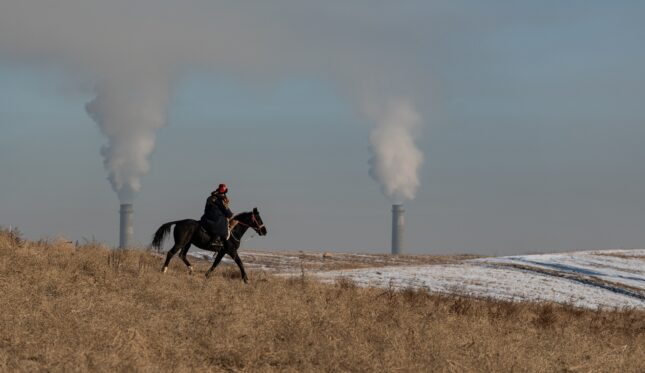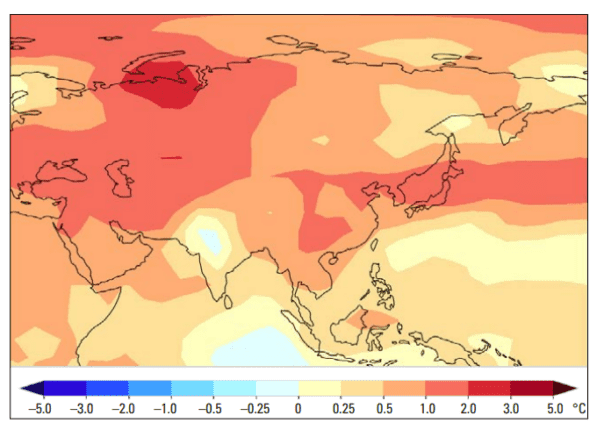-
Can Kazakhstan Meet Its Climate Goals?
April 29, 2024 By Sacha Shaw
“I’m only 33 years old. I have my entire life to live, and I would like to retire on a habitable planet.” | Zulfiya Suleimenova
Signs of our warming planet reveal themselves through the smallest of changes. Zulfiya Suleimenova, Kazakhstan’s Special Representative for International Environmental Cooperation, noticed something odd when she left Kazakhstan’s capital, Astana, in late November for the 28th United Nations Climate Conference (COP28).She wasn’t wearing a winter hat.
“The thing is, that is never the case in Astana,” she said. “Normally, we already have snow in October.” But in November 2023, there was no snow. And the change in weather patterns had Kazakhstanis worried.Other signs of climate change’s effects on Kazakhstan are more obvious. In April 2024, more than 120,000 people have been forced to evacuate their homes in northern Kazakhstan in the wake of devastating flooding.
Although few realize it, Kazakhstan, one of Central Asia’s energy and agricultural powerhouses, is on the frontline of the climate crisis. The landlocked country is warming two times faster than the global average, with 9 of its 10 hottest years on record in this century.
Figure 2 Mean near surface temperature anomalies (°C, difference from the 1991–2020 average) for 2023 ‘State of the Climate in Asia 2023’ (WMO-No. 1350)
Climate change in Kazakhstan has implications for millions of people throughout the region. Afghanistan is particularly vulnerable, having imported more than 90% of its wheat from Kazakhstan alone in 2022. Given the critical food insecurity, with 40% of Afghans already experiencing high levels of acute food insecurity, the consequences of diminishing yields in Kazakhstan would be dire.
Yet, the government in Astana is not only doubling down on carbon-intensive energy but also using state-owned enterprises to stifle market competition—pumping the brakes on the much-needed deployment of renewable energies and binding the Kazakh economy to costly and polluting infrastructure. What’s more, Astana is undermining its domestic capacity to produce climate science, limiting its ability to address current and future climate-related risks.
Suleimenova, previously the Minister of Ecology and Natural Resources and recently appointed as the Presidential Advisor and Special Representative for International Environmental Cooperation, told me about the unique political challenges Kazakhstan faces.
When I asked her about the future of Kazakhstan’s coal industry, she admitted that the end of the coal era is approaching.
Where Climate Research Lags BehindThe impacts of the climate crisis in Central Asia are, on the whole, not well understood. According to the Intergovernmental Panel on Climate Change (IPCC), the region has the least available research and data compared to other regions throughout Asia.
Suleimenova alluded to how hard it is to get data but blamed the IPCC for the lack of climate models and projections. But when I asked the IPCC, it dismissed the accusation, saying it was the responsibility of states and observer organizations to bring “science and data into the drafting process of IPCC assessment reports.” IPCC claims it does not conduct original research but it does assess existing scientific literature.
So, why is Kazakhstan’s academic and research capacity lagging behind?
Rustam Nassirkhan, Director of the Department of Modeling, Analysis and Forecasting at JSC Zhasyl Damu, the emissions trading operator and subsidiary of the Ministry of Ecology and Natural Resources, said problems in Kazakhstan’s climate research capacity are a legacy of climate denial under the Soviet Union. He also blamed systemic neglect and corruption.
The whole research funding system has very limited funds, Nassirkan said. It’s very weak and corrupt. And it doesn’t promote meritocracy. “There is no political ownership and mandate, high opposition from fossil fuel asset owners and vested interest of state-owned enterprises, high inertia in other sectors, and absence of qualified personal at all levels,” he said.Kazakhstan has set a target to be carbon neutral by 2060, with interim goals of a 25% emissions reduction target by 2030 conditional on international support and a backup floor of an unconditional 15% reduction by 2030.
However, whether it can achieve the unconditional target of 15% is in doubt— jeopardizing any chance at reaching the 2060 target.
To reach the target of 15% emissions reduction, the power sector would have to quickly decarbonize. According to Nassirkhan, Kazakhstan’s energy grid would require an ambitious uptake of 24% renewable energy penetration by 2030 to achieve that target; and likely even more if other sectors fail to decarbonize, something, which he suggests, is quite likely to occur.Nassirkhan is not the only one with serious doubts about Astana’s ability to meet its climate goals. Both the Climate Change Performance Index and Climate Action Tracker project indicate Kazakhstan will likely fail to reach its reduction targets. Reluctant to move away from its dependence on coal in the short term, Astana is looking for ways to appear to align with its climate targets.
Nuclear Fait Accompli
As a behemoth in the export of uranium, Kazakhstan captures roughly 60% of global market share. And its share is likely to increase due in part to a boom in China’s appetite for the resource, as well as instability caused by the recent coup in Niger—which sent France and other EU countries scrambling to secure alternative supply sources.
Despite being well endowed with the natural resource, Kazakhstan has never used uranium to supply its domestic energy market. However, last year, aware of the difficulties ahead on the road to decarbonization, Astana opened the door to nuclear power, suggesting a national referendum.
But like many post-Soviet countries, Kazakhstan has a complicated history with anything nuclear. For over 40 years during the Cold War, it was the site of many weapons tests. Suleimenova was keen to underscore the scars the nuclear industry had left on her country. Even so, she told me that it’s important to ask people what they want. “It’s important for the climate agenda,” she said.
Kazakhstan’s President Tokayev this year similarly emphasized the primacy of the people’s opinion in any decision on nuclear power. “Citizens shall consider and discuss all the experts’ arguments for and against making a balanced, thoughtful decision during the free expression of their will,” he said. “This will be the decision of the people.”
Yet some doubt how “national” the national referendum will be. And they argue that Astana has already decided to approve the construction of a nuclear power plant—essentially a nuclear fait accompli—making the whole discussion moot.
The disquiet stemmed, in part, from comments by then—and now dismissed—Vice Minister of Energy Zhandos Nurmaganbetov. In June 2023, he suggested a referendum was not necessary. And doubts about Kazakhstan’s general democratic credentials have led people to question whether a national referendum would take place.
Nassirkhan explained that town people would likely support a local referendum on building a local nuclear plant, since it will bring jobs, but a national voice will be excluded.In a statement, The Ministry of Energy told me that a “referendum is held throughout the territory of the Republic,” but it refused to go into specifics.
If Astana does not proceed with a truly national referendum, foreign governments and willing international companies ready to ink contracts may question the legitimacy of the new, and potentially highly profitable nuclear industry. Yet, for an authoritarian state where the president wields centralized control, a non-national referendum would not be a surprise.
However, for communities both inside and outside Kazakhstan, how Astana moves to embrace nuclear power is important. The success of many nuclear projects—and arguably the industry at large—hinges on community support. If a nuclear future is built upon illiberal and undemocratic foundations, what can be said about the long-term security of these projects and, by extension, attempts to decarbonize?Sacha Shaw is an independent journalist and researcher, specializing in climate and environmental issues.
Sources: Climate Action Tracker, Climate Change Performance Index, Eurasianet, Kazhydromet, Ministry of Ecology and Natural Resources of the Republic of Kazakhstan, OEC, The Astana Times.Photo credit: A rider on a horse rides across the steppe against the background of the smoking chimneys of a coal power plan, courtesy of MaxZolotukhin/Shutterstock.com
 A Publication of the Stimson Center.
A Publication of the Stimson Center.




